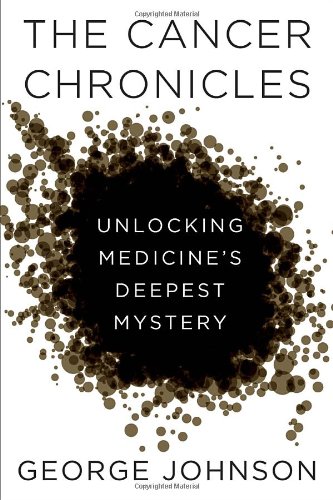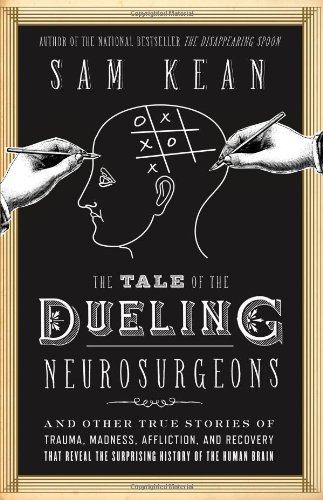 I have recently reviewed books about the discovery and treatment (The Philadelphia Chromosome) and the causes of cancer (Toms River). So the subject matter in George Johnson's The Cancer Chronicles is quite familiar to me. Johnson does have a unique angle – his wife was diagnosed with uterine cancer, which led him to use his expertise as a science writer to learn more about the disease. This perspective helps create a personal element to the book, but does not distract from the science.
I have recently reviewed books about the discovery and treatment (The Philadelphia Chromosome) and the causes of cancer (Toms River). So the subject matter in George Johnson's The Cancer Chronicles is quite familiar to me. Johnson does have a unique angle – his wife was diagnosed with uterine cancer, which led him to use his expertise as a science writer to learn more about the disease. This perspective helps create a personal element to the book, but does not distract from the science. Several of the stories were previously covered in other books that I have reviewed: Boveri's prescient hypothesis linking chromosomal aberrations with cancer (The Philadelphia Chromosome), Thomas Hunt Morgan's mutant fruit flies (The Violinist's Thumb), scrotal cancer in chimney sweeps (Toms River), and the Radium girls (The Poisoner's Handbook). Johnson covers new ground in the chapter called "Jurassic Cancer", which examines the other animals in which cancers have been found. In fact, most animals get cancer; the one exception is naked mole rats. Surprisingly, various types of malignancies have even been identified in dinosaur fossils. Another chapter examines how far back in human populations cancers have been described. Johnson writes, "There were signs of cancer in an Iron Age man in Switzerland and a fifth century Visigoth from Spain" (p 49). In both animals and humans, it is difficult to know the exact frequency of the disease, but it is clear that cancer is not strictly linked to industrialization or environmental factors.
 |
| Hanahan and Weinberg, 2000. |
Johnson also discusses cancer cell evolution, which is a topic of intense interest in scientific research. Cancer cells are constantly changing to evade the body's defense mechanisms. During treatment, some cancer cells can develop resistance to chemotherapeutics. Understanding how chemoresistant cancers can be treated is a major unanswered question. In the case of Gleevec/imatinib-resistant cancer, a single mutation is responsible for Gleevec-resistance, which allowed the development of a second drug (nilotinib) to kill cells with the imatinib-resistant mutation. Unfortunately, and as is to be expected with a complex disease such as cancer, most chemo-resistant cancers are not as clear cut.
Overall, the book is quite easy to read and covers many important topics, albeit not at the depth of other, more focused books on the topic of cancer. I will definitely be adding The Emperor of All Maladies to my reading list to give this topic another perspective.
** Post script: Johnson's book was short-listed for the 2014 Royal Society Winton Prize for Science books.

